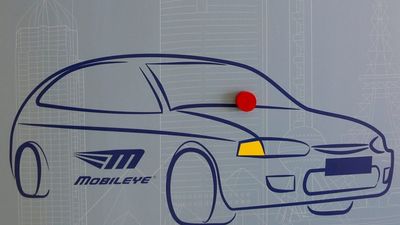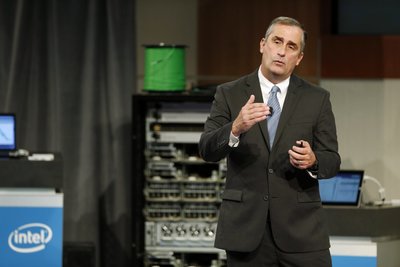Intel "Real Serious" About Autonomous Cars; Buys Mobileye For $15.3 Billion
TACH's TAKE: Silicon Valley On Its Way To Disrupt The Auto Industry And Historic Need For Traditional Car Companies
JERUSALEM March 13, 2017; Tova Cohen and Ari Rabinovitch writing for Reuters reported that U.S. chipmaker Intel (INTC.O) agreed to buy Israeli driverless car-technology firm Mobileye (MBLY.N) for $15.3 billion on Monday, positioning itself for a dominant role in the fast-moving autonomous-driving sector.
The $63.54-per-share cash deal marks the largest purchase of a company solely focused on the self-driving sector and could significantly alter the competitive landscape among key technology and systems suppliers, including chipmakers Nvidia Corp (NVDA.O) and Qualcomm Inc (QCOM.O) and systems integrator Delphi Automotive PLC (DLPH.N).
Mobileye's shares jumped 30 percent to $61.30 in late morning U.S. trading, while Intel's shares were down 2 percent. Shares of Delphi, which has partnerships with both companies, were up 3 percent.
The deal underscores the expanding alliances between automakers and their suppliers as they race to develop self-driving cars, a concept that once seemed a science-fiction dream but is drawing closer to reality.
While Intel is known for hardware chips and Mobileye for collision detection and mapping software, the merger promises to create an expanded portfolio of technologies needed for driverless vehicles. It also strengthens Intel's position in the sector against rival chipmakers Nvidia and Qualcomm.
The Intel-Mobileye portfolio includes cameras, sensor chips, in-car networking, roadway mapping, machine learning, cloud software and data fusion and management.
"It's an area where (Intel) has had very little presence - the automotive market, and so this is a tremendous opportunity for them to get into a market that has significant growth opportunities," said Betsy Van Hees, an analyst at Loop Capital Markets.
"Mobileye's technology is very critical... The price seems fair," she added.
The offer represents a premium of about 33 percent to Mobileye's closing price of $47 on Friday.
MERGING 'EYES' AND 'BRAIN'
Intel will integrate its automated driving group with Mobileye's operations, with the combined entity being run by Mobileye Chairman Amnon Shashua from Israel.
Intel Chief Executive Brian Krzanich said the acquisition was akin to merging the "eyes of the autonomous car with the intelligent brain that actually drives the car."
Mobileye supplies integrated cameras, chips and software for driver-assist systems - the building blocks for self-driving cars - to more than two dozen vehicle manufacturers.
In an interview in January, Shashua told Reuters: "If you want to build a truly autonomous car, this is a task for more than one player... The idea is to have a number of partners to share resources and data."
Mobileye was an early supplier of vision systems to Tesla, but the two companies had an acrimonious and public break-up last summer after the driver of a Tesla Model S was killed while operating the vehicle using Tesla's Autopilot system.
Intel said it expects the vehicle systems, data and services market to rise to $70 billion by 2030.
Mobileye, founded in 1999, accounts for 70 percent of the global market for driver-assistance and anti-collision systems. It employs 660 people and had adjusted net income of $173.3 million last year.
Analysts said that mounting a counter-bid would be difficult as Mobileye's Shashua would remain in charge and the combined entity would be based in Israel.
Shashua and two other senior Mobileye executives stand to do well by the deal: together they own nearly 7 percent of the company. Shmuel Harlap, Israel's biggest car importer and one of Mobileye's earliest investors, also holds a 7 percent stake.
BATTLE FOR SELF-CONTROL
Mobileye and Intel are already collaborating with German automaker BMW (BMWG.DE) on a project to put a fleet of around 40 self-driving test vehicles on the road in the second half of this year.
At the same time, Mobileye has teamed up with Intel for its fifth-generation of chips that will be used in fully autonomous vehicles that are scheduled for delivery around 2021. Mobileye also has partnered with Delphi on a self-driving platform that is being shopped to smaller car companies that may not have the resources to develop their own systems.
Last October, Qualcomm announced a $47 billion deal to acquire the Netherlands' NXP, the largest automotive chip supplier, putting pressure on other chipmakers seeking to make inroads in the market, including Intel, Mobileye and Nvidia.
The Qualcomm-NXP deal, which will create the industry's largest portfolio of sensors, networking and other elements vital to autonomous driving, is expected to close later in 2017.
For a dozen years, Mobileye has relied on Franco-Italian chipmaker STMicroelectronics to produce chips that the Israeli company sells to many of the world's top automakers for its current, third-generation of driver-assistance systems.
Mobileye's relationships with automakers, leading suppliers and STMicroelectronics will continue uninterrupted, the companies said in their statement, and Mobileye's current product roadmap will not be affected.
(Additional reporting for Reuters by Edward Taylor, Eric Auchard, Narottam Medhora and Paul Lienert; Editing by Dan Grebler)
E - mail to Intel Employees by Intel CEO Brian Krzanich on March 13
Intel employees, I am very excited to announce today that Intel has entered into an agreement to acquire Mobileye , the leading supplier for computer vision systems in the automotive industry.
T he acquisition of Mobileye brings together the assets of Intel ’s Xeon processors, FPGAs, 3 D X P oint memory, and 5G modems with the world leader in automotive computer vision. This acquisition essentially merges the intelligent eyes of the autonomous car with the intelligent brain that actually drives the car .
A utonomous d riving is estimated to be a $70 billion vehicle systems and data services TAM opportunity by 2030. The combi nation of I ntel’s high performance comput ing and con nectivity solutions with Mobileye’s best in class computer vision technology will put us in a position to accelerate innovation for car - makers and lead in delivering the technology foundation for highly and fully autonomous driving . Our complementary assets accelerate the “rack scale” end - to - end autonomous solutions that customers demand. I truly believe we are better together.
Many of you have asked why we think autonomous cars and vehicles are so import ant to Intel ’s future. The answer is DATA. Our strategy is to make Intel the driving force of the data revolution across every technology and every industry. We are a DATA company. The businesses we focus on , and deliver solutions to, create, use and analyze massive amounts of data.
I recently had a chance to speak at the LA Auto show and the title of my presentation was “ Data is the N ew Oil.” My message was simple: automobiles and the automotive industry ar e increasingly driven by data and computing. The saying “What’s under the hood” will increasingly refer to comput ing , not horsepower.
At four terabytes of data per day, the average autonomous car will put out the data equivalent of approximately 3 , 000 peo ple. Put just one million autonomous vehicles on the road and you have the data equivalent of half the world ’ s population. This massive amount of data requires all of Intel ’s assets to provide the cost - effective high - performance solutions our customers need. The addition of Mobileye to our family provides the data path to our computing solutions becoming the intelligent set of eyes that will allow a vehicle to see and define the world around it .
I can’t wait to begin working with the combined global autonomous driving organization. It is important to note, however, that the next several months will be business as usual for both Intel and Mobileye . We are legally required to operate as separate companies until the trans action closes, which is expected to occur within the next nine months.
As you’ve heard me say, o thers predict the future. At Intel , we build it. This is not the first time we’ve taken bold steps that have transformed our future, the industry and the impa ct of technology on the world . I believe that today’s announcement puts us in the driver’s seat to achieve our vision of creating the technology foundation on which the future of autonomous driving will be built.
Brian
Auto Industry Journalist Comments:
Bob Gordon, Co-publisher The Auto Channel
A long and serious interview with Intel execs in their exhibit at the 2017 NAIAS (Detroit Auto Show)convinced me that Intel was to be a major player in the eventual replacement of traditional auto makers by digital companies...here we go. Buh-bye Car Makers.
Michelle Krebs, executive analyst for Autotrader:
“Intel’s proposed purchase of Mobileye is yet-another example of the growing link between traditional technology companies and the auto industry, as both sides work to play a leading role in a future of self-driving cars. This deal would greatly expand Intel’s automotive reach with immediate entree to autonomous technologies through Mobileye, which has a long, impressive list of automotive partners and customers, from auto supplier Delphi to German luxury automaker BMW.”
Rebecca Lindland, executive analyst for Kelley Blue Book:
“Intel's purchase of Mobileye is a fascinating cascading effect: A middle-aged company (Intel is 50 years old) purchasing the talents and capabilities of a teenage company (Mobileye is 18 years old) to help modernized mature companies (100-plus-year-old GM, Daimler, etc.). If all three of these generations of companies draw on the expertise each brings, the possibilities are endless.”




